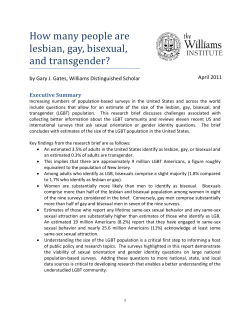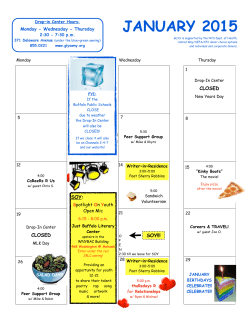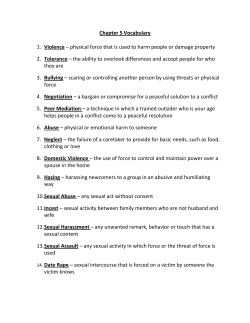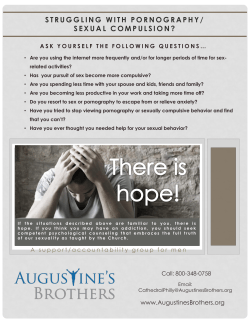
I Think I Might Be Bisexual, Now What Do I Do? A Brochure by and
Advocates for Youth 2000 M Street NW Suite 750 Washington, D.C. 20036 USA 202.419.3420 www.advocatesforyouth.org www.youthresource.com www.ambientejoven.org II Think Think II Might Might Be Be Bisexual, Bisexual, Now Now What What Do Do II Do? Do? A Brochure by and for Young People What Does It Mean to Be Bisexual? Being bisexual means we have the potential to be attracted to either sex. Some bisexuals, like me, may be attracted to each sex in a different way; but basically, we are capable of loving people of either sex. Mikey, United Kingdom, age 14 2 3 You might find that you like both sexes equally, or you might like one sex more than the other. It depends on you. Irene, Ireland, age 19 isexual people have the capacity to love people of either gender. This can include physical, sexual, and emotional attraction to and/or relationships with men and women. Over time in life, a bisexual person might feel equally attracted to men and women or to one gender in preference to the other. The strength of these attractions may change over time. Being bisexual does not define either one’s lifestyle or sexual behavior. Bisexual people may be monogamous or abstinent or may have multiple sexual partners, just like heterosexual and lesbian and gay people. Many people are bisexual and bisexuality cuts across distinctions of race/ethnicity, gender, age, class, ability, and religious affiliation. You are not alone, and you are likely to meet bisexual people just about anywhere you go. B How Do I Know If I’m Bisexual? etermining your sexuality can be highly confusing. Teenagers often feel a lot of pressure to choose - to define themselves as being heterosexual or homosexual. You might feel that you do not fit either of these categories, and you may notice that you are ‘turned on’ and have sexual feelings about both your own and the other gender. These feelings may indicate you will identify as bisexual. Keep in mind, however, that you do not have to prove you are bisexual. There is no test for bisexuality. D 4 Am I Normal? There is a lot of confusion at first. Society teaches that people can only be one way or the other [gay or straight] or that bisexuality is a stage or a phase, and one doesn’t stay there for very long. But once past the confusion, you’ll know you are bisexual as surely as your pal knows she’s straight and your other pal knows he’s gay. You are normal. Sexuality is just another part of what makes each person an individual. Scott, Louisiana, age 16 Absolutely! Being bisexual is very natural. It’s a part of who I am. How can loving people be unnatural? Heather, Massachusetts, age 20 Eric, Colorado, age 24 5 I always knew I was attracted to women, but I felt a pull towards men as well. Suzanna, Maryland, age 17 A bisexual person may have one committed relationship that lasts for decades. Many bisexual people have no sexual relationships or have these relationships with people of only one gender; yet, they still consider themselves bisexual. Some people have relationships with people of their own and the other gender, yet do not identify as bisexual. It all comes down to what makes you feel most comfortable and what you perceive yourself to be. Donít worry about not knowing for sure. Sexuality develops over time, and you should feel no pressure to identify in any particular way. es, it is perfectly natural for some people to be bisexual and to feel attracted to people of each gender. Sexual feelings towards women and men are perfectly natural and normal for bisexual people. In the United States, society does not encourage bisexuality, and that can make accepting your bisexuality more difficult. But just like lesbians, gays, and straight people, you are perfectly normal. Y What Is It Like to Be Young and Bisexual? I find a lot of pleasure in my sexuality. It s a natural part of me and not hiding or changing it gives me a real sense of freedom to be myself. It is hard to be a bisexual youth. Most people don’t give us enough credit - they think we are too young to know, or that we are going through a phase. Todd, South Carolina, age 20 Yvette, Australia, age 24 6 his is a difficult question to answer. There is no particular lifestyle attached to bisexuality. Bisexual people come in all shapes and sizes, from all sorts of occupations, and with all levels of education. Bisexuals may or may not be in relationships. Your sexual orientation does not determine who you are or what you do. You may choose to spend your time and energy on friendships or studies. Bisexuals may, however, suffer discrimination or violence because of misperceptions and prejudice from people who are straight, gay, or lesbian. This is why organizations work for bisexual rights and to alleviate misperceptions about bisexual people. T How Can I Avoid HIV, Other STD’s and Involvement in Unwanted Pregnancy? bstinence from sexual intercourse is the surest way to avoid unwanted pregnancy, HIV, and other STDs. Many young people - gay, straight, or bisexual - choose activities other than sex to show affection, such as hugging, kissing, talking, and message. If you do choose to have sexual intercourse, be responsible and protect yourself and your partner. Depending on the gender(s) of the people involved in the relationship, there are several things you should consider: Woman & Woman - Use a barrier (such as a dental dam, latex gloves, or plastic wrap) to reduce the risk of HIV/STD transmission. Woman & Man - Use a condom at every act of anal, oral, or vaginal intercourse to reduce the risk of HIV transmission and pregnancy. For best results, use another form of birth control and a condom. Man & Man - Use a condom and plenty of lubricant at every act of anal intercourse. Use a condom for oral intercourse as well. Any Sexual Relationship - Remember to always use water based lubricants with condoms. Oil based lubricants can break down latex. A Remember that blood-to-blood contact is the most direct route for HIV transmission. Sharing equipment or needles - for using drugs, taking medications, or piercing or tattooing the body - is dangerous since blood may be left on the used equipment or needles. Always use new needles and other equipment or else clean the needles/equipment by rinsing several times with bleach, then with water. 7 How Do I Learn to Like Myself? Know that you are special, you are not an anomaly. Surround yourself with supportive people. Maia, North Carolina, age 20 The only way you will like yourself is to be yourself. Don’t let other people’s bigotry make you feel bad about who you are. Scott, Louisiana, age 16 oming to terms with your bisexuality can be difficult. However, many people have difficulty learning to like themselves, regardless of their sexual orientation. Many people also have difficulty understanding bisexuality, and some bisexual people may try to hide their bisexuality. In an effort to numb the effects of societal stigma, bisexual youth may turn to drugs and alcohol and may even attempt suicide because their situation seems unbearable. Millions of other bisexual people - just like you - lead successful, happy lives. It helps to be informed and to know that you arenít alone. Read about bisexuality. Learn what it means to be bisexual. Make an effort to meet other bisexuals - they can be a valuable resource to build your self-confidence. C 8 Advocates for Youth has web sites by and for young people who are gay, lesbian, bisexual, and transgender (GLBT), www.youthresource.com and www.ambientejoven.org . You may wish to visit these web sites. More than 15,000 gay, lesbian, bisexual, and transgender youth visit them each month; most of them visit repeatedly. Or, there may be a GLBT youth group in your area. Just remember that there are bisexual people wherever you are. Sooner or later you will meet someone who feels some of the same things you do and has had similar experiences. Realizing that you are not the only bisexual person will make liking yourself a lot easier. Whom Should I Tell? It’s a good idea not to come out until you are comfortable with your bisexuality. Don’t come out because you feel you must, because people are pressuring you, or because you want to be cool and make an impression. Come to think of it, those are also not good reasons to stay in the closet. Just take it at your own pace. This isn’t about other people, only you. Steven, age 20 I find coming out less difficult the more you do it. The first time is really hard, but it gets easier. It is also very liberating. Maia, North Carolina, age 20 The first person I told I was bisexual was a new boyfriend. I wanted to be completely honest with him about myself and let him get to know the real me. I told him, I fell in love with a woman once. He smiled and said, What a coincidence. Me too. Tess, Virginia, age 25 9 How Can I Meet Other Bisexual People? If you decide to come out openly, you may find some bisexuals walking right up to you! Steven, age 20 Currently, I am a member of a community queer youth group in my area, and it is a great way to meet people. Suzanna, Maryland, age 17 10 11 t may be difficult to believe, but bisexual people are all around you! How can you meet them? I oming to terms with your own sexuality can be very difficult. In fact, the hardest person you may ever have to tell is yourself! Only tell others when you feel you are ready. It's not always easy. Some people might be very receptive, while others might not be able to handle the information as well as you had hoped they would. Sometimes it might be easier to talk about your sexuality with someone you know will understand, such as a friend, sibling, parent, guidance counselor or other trusted adult. You may also find someone to talk with through the Internet or at youth groups. Reaching out can help ensure you have support as you talk about your sexuality. You might be surprised at the relief you will feel when you know others understand you. C Check to see if there is a gay, lesbian, bisexual, transgender (GLBT) youth group in your community. Call a local gay and/or lesbian organization for assistance in finding a youth group. Check the phone book for a local hotline and call for support and information about local GLBT groups. Look for local GLBT newspapers. Check local bookstores, health food stores, and gay bars for copies. Adapted from a brochure from the Campaign to End Homophobia. Special thanks to Jessie Gilliam.
© Copyright 2025










